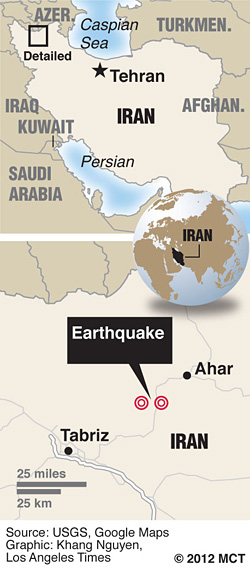 By Alex Kane Rudansky, McClatchy Newspapers –
By Alex Kane Rudansky, McClatchy Newspapers –
WASHINGTON — Mahdis Keshavarz has the means and the motivation to help her friends and family in Iran who have been affected by the recent earthquake, but she says U.S. sanctions against Iran stand in her way.
“You’re seeing these photos of the victims suffering and your instinct is … to help people,” said Keshavarz, an Iranian-American who owns the Make Agency, a New York-based media firm that specializes in Middle East arts, culture and politics projects. “The thing getting in your way is a rule that is not humane.”
The estimated death toll from Saturday’s two temblors has risen above 300 with another 3,000 people injured, according to some reports. The quake comes as the United States is increasing economic sanctions against Iran to put pressure on the country’s nuclear ambitions, frustrating U.S. residents who now want to offer humanitarian assistance but say too that much confusion surrounds what is and isn’t permitted.
Charitable donations to Iran in the form of cash aren’t allowed from the United States unless they’re specifically licensed by the federal government, said John Sullivan, a spokesman for the Treasury Department.
There are a few exceptions: Food and medicine are exempt from the sanctions; Americans are allowed to donate them to ordinary Iranians without needing a license, Sullivan said. Personal remittances sent to family members and friends are allowed, but the money can’t be sent from a U.S. bank to an Iranian bank, he said.
Put into practice, though, sending money to family members poses a challenge, said David Elliott, the assistant policy director at the National Iranian American Council in Washington.
“Technically there are exemptions, but in many cases you’ll find there are no banks that will actually facilitate the transactions,” Elliott said.
Problems interpreting the sanctions persist, said Shiva Balaghi, a visiting professor of Iranian studies at Brown University.
“There’s confusion about what the sanctions mean,” she said. “Unfortunately because of this confusion, most interactions with Iran have become incredibly difficult.”
Keshavarz’s attorneys have advised her to stay away from humanitarian efforts in her home country.
“They said that doing work with Iran at this stage, even on a pro bono basis, opens me up for scrutiny,” she said. Keshavarz moved to the United States in 1979, when she was 3 years old. Her family in Iran survived the recent earthquake without injury, but Keshavarz said she wanted to help her people.
After a 2003 Iranian earthquake killed an estimated 26,000 people, Keshavarz and her community collected money that was allocated to an Iranian nongovernmental organization. It was legal at the time because then-President George W. Bush adjusted the sanctions on Iran because of the quake.
Since this weekend’s disaster, U.S. sanctions on Iran haven’t changed. Obama spokesman Jay Carney said this weekend that the United States stood ready to provide assistance, but that the Iranian government hadn’t called for any international aid at this point.
Some nongovernmental organizations and charities have special licenses that allow them to carry out charitable work with Iran, Sullivan said.
However, because the Iranian Red Crescent hasn’t yet appealed for international assistance, the International Red Cross hasn’t been able to provide assistance there, said Niki Clark, a senior associate for international communications at the Red Cross. There also is no way for Americans to donate to the Red Cross directly for relief for earthquake victims in Iran.
The Turkish Red Crescent is on the border ready to help, but it isn’t allowed to enter Iran at this time, said Balaghi, the Brown University professor. This is due in part to the two countries’ opposite stances on Syria, she said. Iran supports Syrian President Bashar Assad while Turkey supports the rebel Free Syrian Army.
“It is very frustrating for the Iranian-American community to see a disaster like what happened in Iran and really have very few options to respond and to help,” Elliott said.
Mohammad Sharifi of Terre Haute, Ind., encountered those limits last week, before the earthquake, when he tried to send multivitamins and Parkinson’s disease medication to his cousin in Iran.
The Postal Service returned the package to him, even though medication is exempt from the U.S. sanctions on Iran. Sharifi is left looking for answers.
“I’m frustrated,” he said. “I am going out of my way to make sure I’m perfectly in compliance with U.S. laws. … All I’m trying to do is send medicine. It’s strictly a humanitarian matter. It’s not like I’m sending some illegal materials, for crying out loud.”






